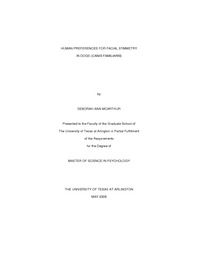
ATTENTION: The works hosted here are being migrated to a new repository that will consolidate resources, improve discoverability, and better show UTA's research impact on the global community. We will update authors as the migration progresses. Please see MavMatrix for more information.
Show simple item record
| dc.contributor.author | McArthur, Deborah A. | en_US |
| dc.date.accessioned | 2009-09-16T18:18:26Z | |
| dc.date.available | 2009-09-16T18:18:26Z | |
| dc.date.issued | 2009-09-16T18:18:26Z | |
| dc.date.submitted | January 2009 | en_US |
| dc.identifier.other | DISS-10241 | en_US |
| dc.identifier.uri | http://hdl.handle.net/10106/1689 | |
| dc.description.abstract | Previous studies on facial symmetry have documented a positive correlation between symmetry and perceived attractiveness in both human and non-human subjects. Evolutionary psychologists believe this may be evidence of a biological bias for symmetry based on the assumption that higher degrees of symmetry indicate genetic quality and a successful period of development, which is important for mate selection. The purpose of this study was to determine if this preference for symmetry would emerge if subjects were asked to assess facial attractiveness of hetero-specifics, specifically dogs, <italic>Canis familiaris</italic>. Three levels of symmetry of a frontal photograph of a dog's face were created: perfectly symmetrical (a blending of the normal photo with its mirror image), normal and asymmetrical (a 10% increase in asymmetry). The photographs were paired in three possible combinations and shown simultaneously to dog breeders as well as non-dog breeders. Chi-square and binomial tests were used to detect differences in proportions between the three comparisons varying in symmetry. Findings suggest both breeders and non-dog breeders found symmetry attractive. Out of the three types of comparisons, the non-dog breeder's had the highest preference for the more symmetrical face for the asymmetrical/perfectly symmetrical comparison. However, the dog breeders had similar preferences for the more symmetrical face for both the asymmetrical/perfectly symmetrical and perfectly symmetrical/normal comparisons. Limitations and future studies are also discussed. | en_US |
| dc.description.sponsorship | Mellgren, Roger | en_US |
| dc.language.iso | EN | en_US |
| dc.publisher | Psychology | en_US |
| dc.title | Human Preferences For Facial Symmetry In Dogs (Canis Familiaris) | en_US |
| dc.type | M.S. | en_US |
| dc.contributor.committeeChair | Mellgren, Roger | en_US |
| dc.degree.department | Psychology | en_US |
| dc.degree.discipline | Psychology | en_US |
| dc.degree.grantor | University of Texas at Arlington | en_US |
| dc.degree.level | masters | en_US |
| dc.degree.name | M.S. | en_US |
| dc.identifier.externalLink | http://www.uta.edu/ra/real/editprofile.php?onlyview=1&pid=155 | |
| dc.identifier.externalLinkDescription | Link to Research Profiles | |
Files in this item
- Name:
- McArthur_uta_2502M_10241.pdf
- Size:
- 1.484Mb
- Format:
- PDF
This item appears in the following Collection(s)
Show simple item record


